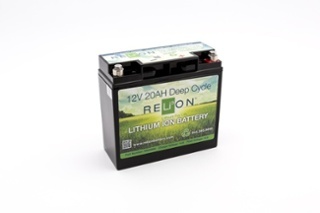 If you have researched lithium-ion technology as an alternative battery solution for your product, you may already be aware of lithium’s benefits: Lithium technology lasts ten times longer than most lead acid batteries, offers more efficiency and requires less maintenance.
If you have researched lithium-ion technology as an alternative battery solution for your product, you may already be aware of lithium’s benefits: Lithium technology lasts ten times longer than most lead acid batteries, offers more efficiency and requires less maintenance.
However, you may be unsure whether a lithium battery is right for your engineered application. You need to get the facts first. After all, making a battery switch is no small decision.
Engineers sometimes assume that lithium batteries don’t match their needs for the following reasons:
- Lithium-ion batteries are an investment.
- It’s a common myth that lithium’s chemistry is unsafe.
- The product needs a battery with odd dimensions or unique voltage requirements.
While it’s true that lithium batteries are an investment, durability and a long life span give lithium long-term value. Customers must replace a lead acid battery every two to three years. This causes frustration and negatively impacts your brand reputation. Lithium batteries, on the other hand, often last as many as ten years, with an eight-year warranty offered by some battery providers.
Lithium technology also includes built-in safety features, such as temperature sensors that prevent your battery from overheating. The key is to find a trustworthy provider that ensures these safety measures are in place before they ever sell you a battery.
Finally, your battery provider is able to create a custom lithium battery to meet your exact charge and shape specifications. If you can’t find an off-the-shelf solution for your product, rely on an expert to help you design the perfect fit.
Choose Between Custom And In-Stock Lithium Batteries
There are many factors involved in designing a custom lithium battery for your application. In your consultation with your battery provider, you’re asked a series of questions about how your product operates.
Next, your expert helps you properly “size” your battery, or determine its required energy charge. The following measurements are used to size your lithium battery:
- Voltage
- Amp-hours
- Depth of discharge
- Recharge rate
Your required daily capacity and cycle life are also taken into consideration. A provider helps you avoid common mistakes such as designing a battery without enough capacity to power your system.
If you prefer not to design a custom battery, you’re likely to find suitable lithium-ion batteries in stock with a large provider. Look for a battery maker with a global presence and one of the greatest stocks in North America.
Your battery provider should guarantee shipping within one business day so you don’t have to wait around before readying your products for sale. And if your batteries are not in stock, your provider must rush to get them to you, paying for your shipping costs.
You need superior customer service from a team of experts willing to help you find the right solution for your power needs. An advisor should be available to answer all of your questions about lithium battery benefits, care and recycling. In the hands of an expert, you’re certain to find a battery compatible with your application.
To learn more about how to calculate your energy needs and find the optimal battery for your application and usage, visit our Lithium Battery Selector Tool.